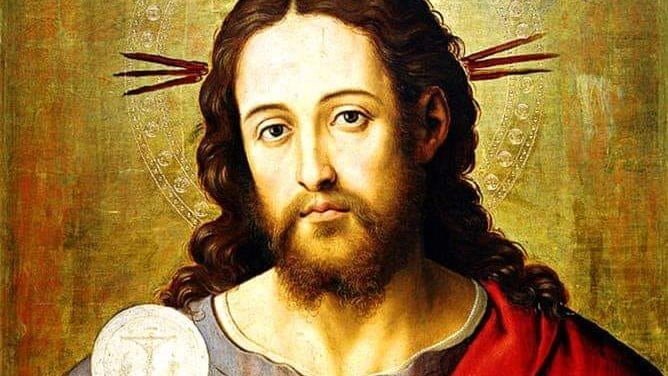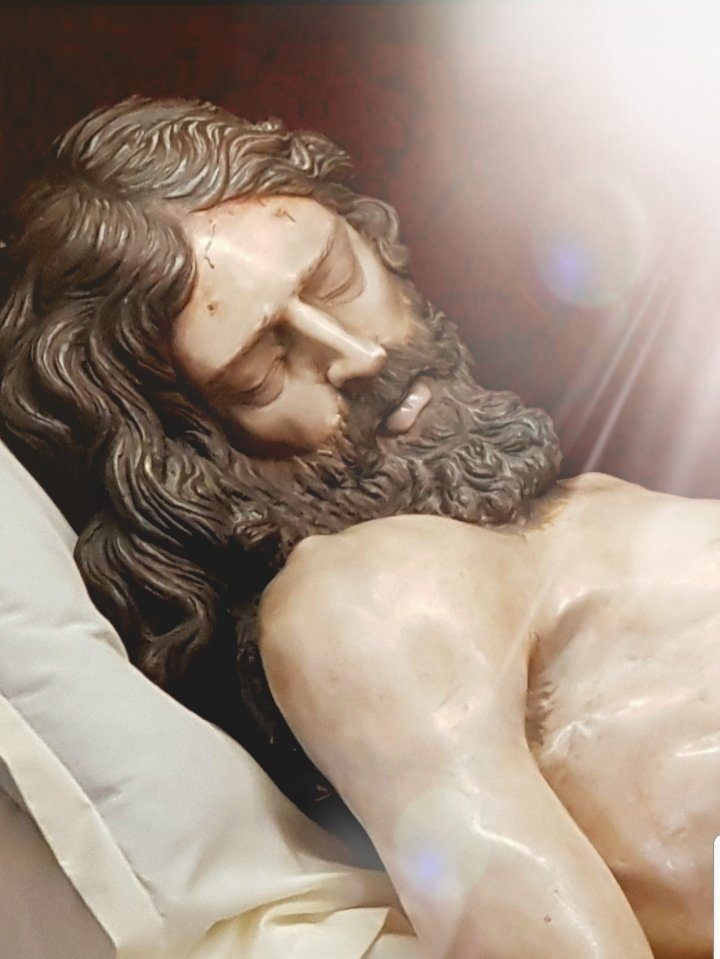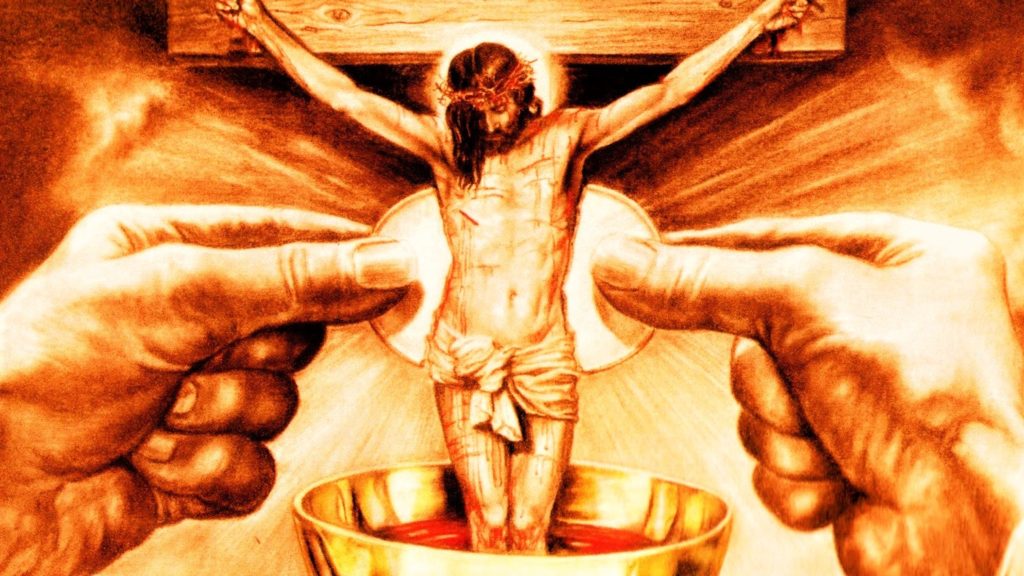Thursday, 3rd week of Easter
DAILY GOSPEL COMMENTARY:
“THE BREAD I WILL GIVE IS MY FLESH” Jn 6:44-51.

READING I
Acts 8:26–40
The angel of the Lord spoke to Philip, “Get up and head south on the road that goes down from Jerusalem to Gaza, the desert route.” So he got up and set out. Now there was an Ethiopian eunuch, a court official of the Candace, that is, the queen of the Ethiopians, in charge of her entire treasury, who had come to Jerusalem to worship, and was returning home. Seated in his chariot, he was reading the prophet Isaiah. The Spirit said to Philip, “Go and join up with that chariot.” Philip ran up and heard him reading Isaiah the prophet and said, “Do you understand what you are reading?” He replied, “How can I, unless someone instructs me?” So he invited Philip to get in and sit with him. This was the Scripture passage he was reading: Like a sheep he was led to the slaughter, and as a lamb before its shearer is silent, so he opened not his mouth. In his humiliation justice was denied him. Who will tell of his posterity? For his life is taken from the earth.
Then the eunuch said to Philip in reply, “I beg you, about whom is the prophet saying this? About himself, or about someone else?” Then Philip opened his mouth and, beginning with this Scripture passage, he proclaimed Jesus to him. As they traveled along the road they came to some water, and the eunuch said, “Look, there is water. What is to prevent my being baptized?” Then he ordered the chariot to stop, and Philip and the eunuch both went down into the water, and he baptized him. When they came out of the water, the Spirit of the Lord snatched Philip away, and the eunuch saw him no more, but continued on his way rejoicing. Philip came to Azotus, and went about proclaiming the good news to all the towns until he reached Caesarea.
RESPONSORIAL PSALM
R. Let all the earth cry out to God with joy.
Or: Alleluia.
Bless our God, you peoples,
loudly sound his praise;
He has given life to our souls,
and has not let our feet slip.
R. Let all the earth cry out to God with joy.
Or: Alleluia.
Hear now, all you who fear God, while I declare
what he has done for me.
When I appealed to him in words,
praise was on the tip of my tongue.
R. Let all the earth cry out to God with joy.
Or: Alleluia.
Blessed be God who refused me not
my prayer or his kindness!
R. Let all the earth cry out to God with joy.
Or: Alleluia.
ALLELUIA
I am the living bread from heaven, says the Lord, if anyone eats this bread he will live for ever.
Gospel of Thursday, 3rd week of Easter.
Jn 6:44–51

Jesus said to the crowds: (44) “No one can come to me unless the Father who sent me draw him, and I will raise him on the last day. (45) It is written in the prophets: They shall all be taught by God.
Everyone who listens to my Father and learns from him comes to me. (46) Not that anyone has seen the Father except the one who is from God; he has seen the Father. (47) Amen, amen, I say to you, whoever believes has eternal life. (48) I am the bread of life. (49) Your ancestors ate the manna in the desert, but they died; (50) this is the bread that comes down from heaven so that one may eat it and not die. (51) I am the living bread that came down from heaven; whoever eats this bread will live forever; and the bread that I will give is my Flesh for the life of the world.”
GOSPEL COMMENTARY from the Navarre Bible, Commentary to the Gospel of St. John (with permission)
vv. 44-45: (44) “No one can come to me unless the Father who sent me draw him, and I will raise him on the last day. (45) It is written in the prophets: They shall all be taught by God. Everyone who listens to my Father and learns from him comes to me.
- Seeking Jesus until one finds him is a free gift which no one can obtain through his own efforts, although everyone should try to be well disposed to receiving it. The Magisterium of the Church has recalled this teaching in Vatican II:
- “Before this faith can be exercised, man must have the grace of God to move and assist him; he must have the interior help of the Holy Spirit, who moves the heart and converts it to God, who opens the eyes of the mind and makes it easy for all to accept and believe the truth” (Dei Verbum, 5).
- When Jesus says “They shall all be taught by God”, he is evoking Is 54:13 and Jer 31:33ff, where the prophets refer to the future Covenant which God will establish with his people when the Messiah comes, the Covenant which will be sealed forever with the Blood of the Messiah and which God will write on their hearts (cf. Is 53:10-12; Jer 31:31-34).
- The last sentence of v.45 refers to God’s Revelation through the prophets and especially through Jesus Christ.
v. 46 Not that anyone has seen the Father except the one who is from God; he has seen the Father.
- Men can know God the Father only through Jesus Christ, because only he has seen the Father, whom he has come to reveal to us. In his prologue St John has already said: “No one has ever seen God; the only Son, who is in the bosom of the Father, he has made him known” (Jn 1:18). Later on Jesus will say to Philip at the Last Supper: “He who has seen me has seen the Father” (in 14:9), for Christ is the Way, the Truth and the Life, and no one goes to the Father except through him (cf. Jn 14:6).
- In other words, in Jesus Christ God’s revelation to men reaches its climax: “For he sent his Son, the eternal Word who enlightens all men, to dwell among men and to tell them about the inner life of God (cf. Jn 1:1-18). Hence, Jesus Christ, sent as ‘a man among men’, ‘utters the words of God’ (Jn 3:34), and accomplishes the saving work which the Father gave him to do (cf. Jn 5:36; 17:4). To see Jesus is to see his Father (cf. Jn 14:9)” (Vatican II, Dei Verbum, 4).
v. 48 I am the bread of life.
- With this solemn declaration, which he repeats because of his audience’s doubts, (cf. Jn 6:35, 41, 48), Jesus begins the second part of his discourse, in which he explicitly reveals the great mystery of the Blessed Eucharist.
- Christ’s words have such a tremendous realism about them that they cannot be interpreted in a figurative way: if Christ were not really present under the species of bread and wine, this discourse would make absolutely no sense. But if his real presence in the Eucharist is accepted on faith, then his meaning is quite clear and we can see how infinite and tender his love for us is.
- This is so great a mystery that it has always acted as a touchstone for Christian faith: it is proclaimed as “the mystery of our faith” immediately after the Consecration of the Mass.
- Some of our Lord’s hearers were scandalized by what he said on this occasion (cf. vv. 60-66). Down through history people have tried to dilute the obvious meaning of our Lord’s words.
- In our own day the Magisterium of the Church has explained this teaching in these words: “When transubstantiation has taken place, there is no doubt that the appearance of the bread and the appearance of the wine take on a new expressiveness and a new purpose since they are no longer common bread and common drink, but rather the sign of something sacred and the sign of spiritual food. But they take on a new expressiveness and a new purpose for the very reason that they contain a new ‘reality’ which we are right to call ontological. For beneath these appearances there is no longer what was there before but something quite different… since on the conversion of the bread and wine’s substance, or nature, into the body and blood of Christ, nothing is left of the bread and the wine but the appearances alone. Beneath these appearances Christ is present whole and entire, bodily present too, in his physical ‘reality’, although not in the manner in which bodies are present in place.
- “For this reason the Fathers have had to issue frequent warnings to the faithful, when they consider this august sacrament, not to be satisfied with the senses which announce the properties of bread and wine. They should rather assent to the words of Christ: these are of such power that they change, transform, ‘transelement’ the bread and the wine into his body and blood. The reason for this, as the same Fathers say more than once, is that the power which performs this action is the same power of almighty God that created the whole universe out of nothing at the beginning of time’’ (Paul VI, Mysterium fidei).
vv. 49-51 Your fathers ate the manna in the wilderness, and they died. This is the bread which comes down from heaven, that a man may eat of it and not die. I am the living bread which came down from heaven; if any one eats of this bread, he will live for ever; and the bread which I shall give for the life of the world is my flesh.”
- The manna during the Exodus was a figure of this Bread — Jesus Christ himself — which nourishes Christians on their pilgrimage through this world.
- Communion is the wonderful banquet at which Christ gives himself to us: “the bread which I shall give for the life of the world is my flesh”.
- These words promise the manifestation of the Eucharist at the Last Supper: ‘‘This is my body which is for you’’ (1 Cor 11:24). The words ‘‘for the life of the world’’ and “for you’’ refer to the redemptive value of the sacrifice of Christ on the Cross.
- In some sacrifices of the Old Testament, which were a figure of the sacrifice of Christ, part of the animal offered up was later used for food, signifying participation in the sacred rite (cf. Ex I 1:3-4).
- So, by receiving Holy Communion, we are sharing in the sacrifice of Jesus Christ: which is why the Church sings in the liturgy of the hours on the feast of Corpus Christi: “O sacred feast in which we partake of Christ: his sufferings are remembered, our minds are filled with his grace and we receive a pledge of the glory that is to be ours” (Magnificat Antiphon, evening prayer II).
VIDEO REFLECTION: TOPIC: ARE YOU WELL-PREPARED TO HELP OTHERS SEARCH FOR LIFE’S MEANING AND BRING THEM TO JESUS?
In today’s first reading, Philip, one of the disciples meets this Ethiopian eunuch on a desert road in Gaza, part of Palestine, which is about 80 km from Jerusalem, where Philip was headed.
This eunuch was the finance minister of the queen and just came back from his pilgrimage to Jerusalem. Eunuchs were given positions of trust in the royal household and, thus, were rich and powerful.
The eunuch, probably a convert to Judaism, was reading aloud Isaiah 53:7-8, one which is read in the liturgy of Good Friday and refers to Christ’s passion foretold. He professes ignorance on what it meant and asks Philip to explain.
We can be like the eunuch, unable to understand the scriptures unless someone explains.
We can also be like Philip. We, too, are given opportunities to share the good news to others. And we must be prepared.
10-MINUTE MEDITATION PODCAST FOR YOUR MENTAL PRAYER
Stay updated: subscribe by email for free TO OUR NEW WEBSITE www.catholicsstrivingforholiness.org (PUT YOUR EMAIL IN THE SUBSCRIBE WIDGET).
We are also in www.fb.com/Catholicsstrivingforholiness. Kindly help more people in their Christian life by liking our page and inviting your family, friends and relatives to do so as well. Thanks in advance and God bless you and your loved ones! Fr. Rolly Arjonillo

